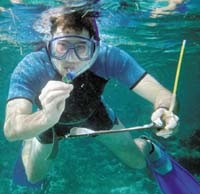Questions drive professor’s research
Open gallery

Algae aren’t the only organisms that have captured Ken Clifton’s attention.
“I’m not a fish specialist or bird specialist,” he admits. “I study animal behavior from an evolutionary point of view. I’m more interested in questions than organisms, so I study a species to answer a question.”
Clifton’s questions focus on what he calls “the big three”: food, sex and death.
“If we understand how these three things relate to organisms, we understand natural selection,” he says. “Animals that successfully find food and mates while avoiding death have higher fitness.
“I want to know why members of a species live together, why they cooperate with each other, what selective factors influence reproduction and why one group of organisms lives in one location instead of another.”
Clifton’s questions have taken him to Kenya to study gazelles; to Panama to study coral reef fish; to Willapa Bay, Wash., to study shorebirds; to Trinidad to study bats; and to St. Croix to study algae.
Coral reefs, he says, are particularly good places to ask questions “because they offer a rich diversity of life that is accessible.”
The locations may seem exotic. “But to observe what is normal behavior and to differentiate it from what is extraordinary behavior, a scientist needs to work in the field every day, even when it’s cold, dark or rainy,” Clifton points out. “Hard work underlies all good research.”
Clifton earned his bachelor’s degree at the University of California at San Diego and his doctorate in biology at the University of California at Santa Barbara. While he conducted most of his post-doctoral research at the Smithsonian Tropical Research Institute in Panama, he also spent two years teaching at the University of California at Santa Cruz.
Clifton joined Lewis & Clark College in 1998 to couple his love of scientific research with his love of teaching.
“Lewis & Clark is committed to both teaching and research,” he states, “and students know it.”
After his first year at the College, three Lewis & Clark students joined Clifton in St. Croix to study the reproductive ecology of green seaweeds. The project was funded by National Geographic.
The following summer, two other students assisted him with his study of shorebird foraging in Willapa Bay. That work, supported by Lewis & Clark’s John S. Rogers Science Research Program, continued the following summer with additional students.
This summer, two additional students will help him continue the research on St. Croix, with stipends provided by a National Science Foundation grant.
Currently, five students are working with him in the laboratory on campus.
Next fall, Clifton will take a sabbatical leave at the University of Guam to extend his Caribbean studies into Pacific waters. Then, in January 2002, he will lead 20 students on an overseas study program in Micronesia to study biology.
“I want students to become thinkers, to understand the role biology plays in their lives and to understand why biology is important,” he says.
“A professor made a difference in my life,” Clifton says. “This is my chance to give back to a new generation of students who care about the world and who want to practice good science.”
-by Jean Kempe-Ware
More L&C Magazine Stories
Lewis & Clark Magazine is located in McAfee on the Undergraduate Campus.
MSC: 19
email magazine@lclark.edu
voice 503-768-7970
fax 503-768-7969
The L&C Magazine staff welcomes letters and emails from readers about topics covered in the magazine. Correspondence must include your name and location and may be edited.
Lewis & Clark Magazine
Lewis & Clark
615 S. Palatine Hill Road MSC 19
Portland OR 97219

